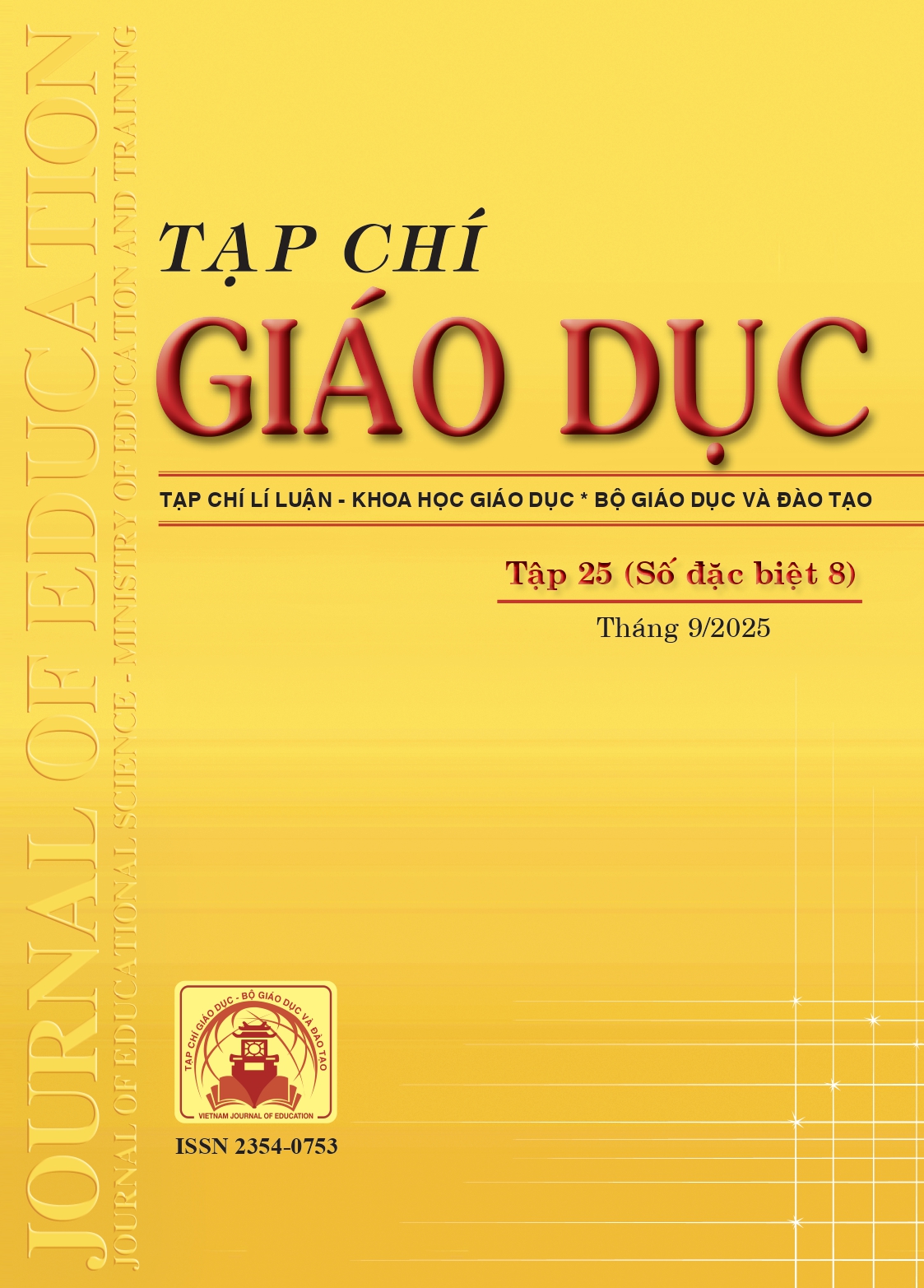Ứng dụng trí tuệ nhân tạo trong dạy học thí nghiệm ở trường phổ thông: đề xuất cách thức triển khai với Google AI Studio và kho thí nghiệm ảo PhET
Tóm tắt
Artificial Intelligence (AI) has become a rapidly developing field of research in education, with a wide range of applications and approaches. This study employs theoretical analysis and literature synthesis as a basis to propose a method for applying artificial intelligence through the Google AI Studio tool, combined with the free PhET virtual experiment library, to enhance the effectiveness of experimental teaching in natural science subjects. The paper focuses on introducing two specific implementation methods: one is using Google AI Studio to support real-life classroom experiments; the other is combining Google AI Studio with PhET for virtual experiments. The study analyzes the potential of this combination in providing a visual, interactive learning environment and personalized guidance. Additionally, the paper discusses the role and activities of teachers in the teaching process when applying both Google AI Studio and PhET tools. The research also highlights the benefits of effectively using these free and accessible tools to improve the quality of teaching and learning in Natural Sciences.
Tài liệu tham khảo
Al Balushi, J. S. G., Al Jabri, M. I. A., Palarimath, S., Maran, P., Thenmozhi, K., & Balakumar, C. (2024). Incorporating artificial intelligence powered immersive realities to improve learning using virtual reality (VR) and augmented reality (AR) technology. In 2024 3rd International Conference on Applied Artificial Intelligence and Computing (ICAAIC) (pp. 760-765). IEEE.
Chafiq, N., Radid, M., Moundy, K., & Srour, C. (2023). The Effect of Integrating Interactive Simulations on the Development of Students’ Motivation, Engagement, Interaction and School Results. International Journal of Emerging Technologies in Learning (Ijet), 18(12), 193-207. https://doi.org/10.3991/ijet.v18i12.39755
Đỗ Thị Tố Như, Nguyễn Thị Ngọc Tuyền, Lê Khắc Quynh (2025). Khai thác và sử dụng một số công cụ trí tuệ nhân tạo (AI) trong dạy học môn Khoa học tự nhiên. Tạp chí Giáo dục, 25(5), 36-41.
Kochmar, E., Vu, D. D., Belfer, R., Gupta, V., Serban, I. V., & Pineau, J. (2020). Automated personalized feedback improves learning gains in an intelligent tutoring system. In Artificial Intelligence in Education: 21st International Conference, AIED 2020, Ifrane, Morocco, July 6-10, 2020, Proceedings, Part II 21 (pp. 140-146). Springer International Publishing.
Kumar, A. (2024). Artificial Intelligence in Education: Revolutionizing Teaching and Learning. Journal of Asian Primary Education (JoAPE), 1(1), 63-67. https://doi.org/10.59966/joape.v1i1.1207
Létourneau, A., Deslandes Martineau, M., Charland, P., Karran, J. A., Boasen, J., & Léger, P. M. (2025). A systematic review of AI-driven intelligent tutoring systems (ITS) in K-12 education. npj Science of Learning, 10(1), 1-13.
Nguyen Thi Hao, Le Phan Diem Phuc (2024). Applying interactive simulation experiment (PhET) to achieve the competence component of inquiring nature for secondary school students. Journal of Science Educational Science, 69(5), 143-152. https://doi.org/10.18173/2354-1075.2024-0125
Nguyễn Minh Giám, Nguyễn Văn Đốc, Nguyễn Thị Hoài Nam, Nguyễn Thị Hương Giang, Ngô Tứ Thành (2023). Xây dựng khung năng lực tự học cho học sinh trung học cơ sở trong dạy học môn Khoa học tự nhiên với sự hỗ trợ của AI Chatbot. Tạp chí Giáo dục, 23(số đặc biệt 9), 35-42.
Saxena, P., Saxena, V., Pandey, A., Prync Flato, U. A., & Shukla, K. (2023). Multiple Aspects of Artificial Intelligence. Book Saga Publications.
Scalise, K., Timms, M., Moorjani, A., Clark, L., Holtermann, K., & Irvin, P. S. (2011). Student learning in science simulations: Design features that promote learning gains. Journal of Research in Science Teaching, 48(9), 1050-1078.
Shrivastava, A. (2024). Artificial Intelligence (AI): Evolution, Methodologies, and Applications. International Journal For Science Technology And Engineering, 12(4), 5501-5505. https://doi.org/10.22214/ijraset.2024.61241
So, H. Y., Chen, P. P., & Chan, T. T. N. (2019). Simulation in medical education. Journal of the Royal College of Physicians of Edinburgh, 49(1), 52-57.
Tang, K. H. D. (2024). Implications of Artificial Intelligence for Teaching and Learning. Acta Pedagogia Asiana, 3(2), 65-79. https://doi.org/10.53623/apga.v3i2.404
Zhang, Y., Yang, Y., Chu, Y., Sun, D., Xu, J., & Zheng, Y. (2024). Virtual Laboratories in Science Education: Unveiling Trajectories, Themes, and Emerging Paradigms (2013-2023). Journal of Baltic Science Education, 23(5), 990-1009. https://eric.ed.gov/?id=EJ1445481
Zhao, H. (2024). AI Application in Secondary School STEM Education. Modern Management Science & Engineering, 6(3), 180-189. https://doi.org/10.22158/mmse.v6n3p180
Zheleva, P. (2024). Application of technologies for virtual and augmented reality with artificial intelligence in the project activity at school. Obrazovanie i Tehnologii, 15(2), 389-395. https://doi.org/10.26883/2010.242.6195
Đã Xuất bản
Cách trích dẫn
Số
Chuyên mục
Giấy phép

Tác phẩm này được cấp phép theo Ghi nhận tác giả của Creative Commons Giấy phép quốc tế 4.0 .












